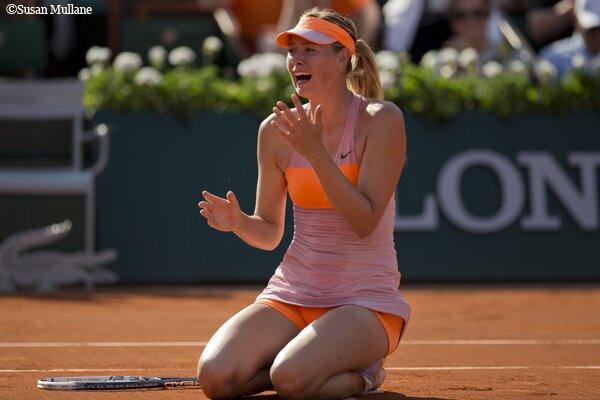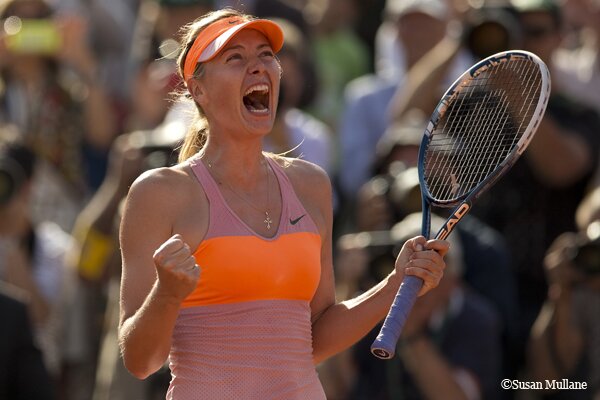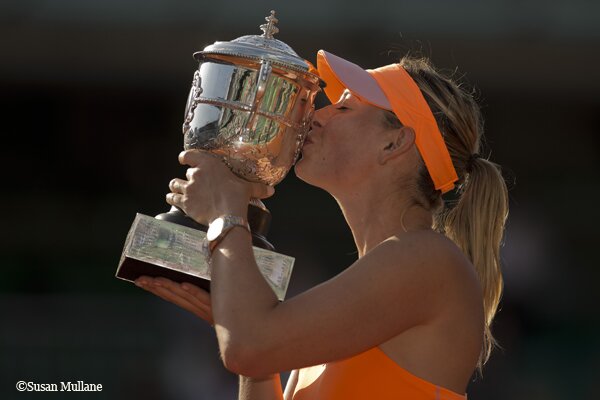By Alix Ramsay
Be careful what you wish for. For years, we have all begged for a decent women’s final – OK, Francesca Schiavone against Sam Stosur wasn’t bad – and for 13 years we have waited for a three setter, but this isn’t quite what we had in mind. This was war.
For three hours and two minutes, Maria Sharapova and Simona Halep were at each other’s throats. They contested 227 points, they laced 66 winners and committed 83 unforced errors. Between them they were forced into 78 further mistakes. There was not so much as a fag paper between them for hour after hour – the final seemed like it would never end. And yet you could not take your eyes off it. This was as ferocious a display of hitting, scrapping and battling as you could imagine. Shazza may be the warrior of the tour but in Halep she almost found her match. Almost, but not quite – the title belongs to Maria 6-4, 6-7, 6-4.
When, at last, she buried her final forehand, she fell to her knees. She didn’t know whether to laugh or cry, one moment holding her head in her hands and the next turning to her small support team and just beaming from ear to ear. 
Sharapova may have her critics and people may not always warm to her, but on Saturday evening she showed the world exactly what she is made of: she is a player and a fighter through and through. Forget the fame and the glamour, she is an out and out jock – she sweats, she grafts and she bleeds if she has to if there is a victory in sight.
She had worked herself into the ground to get this far and now, at last, she had her reward. The sheer, unadulterated joy it gave her made the Ice Queen, the imperious blonde from Siberia, look like a kid at Christmas time. She did not know where to look or what to say; all her dreams had come true at once.
“It’s such an emotional victory for me in my career,” she said. “I have been in many Grand Slam finals, and every one feels very different. I feel like as I get older I appreciate those situations so much more.
When it’s over, after it being such an emotional match, everything just kind of lets go. You just realise you won another Grand Slam, and Roland Garros at that.
“If somebody had told me that at some stage in my career that I’d have more Roland Garros titles than any other Grand Slam, I’d probably go get drunk. Or tell them to get drunk. One or the other.”
That Halep, in her first grand slam final, could push Sharapova so hard and for so long is a warning of what is to come for the old guard. It will not come as much comfort to the Romanian now – to have worked so hard and come away with nothing will take some getting over – but that, as the rookie on the big stage, she did not fold or choke, she did not fret or freeze, will only reinforce her belief that one of these big titles has her name on it.
“I learned that I can play at very high level,” Halep said. “I can play the finals without big emotions. I had incredible, two incredible weeks here. I saw that I can play good at the grand slam, because before I had pressure. Before the tournament in grand slams I cannot play my best tennis. But here I did, and I’m really proud of this.”
But back to Shazza. Years ago, as she struggled at Roland Garros, she amused us all by claiming that she moved like a cow on ice on this infuriating red dirt. At 6ft 2ins – most of it leg – movement is always going to be a bit of an issue but when the ground moves beneath your feet and you are expected to slide into every other shot, it can be a nightmare. And yet here she is today, a veteran of three consecutive French Open finals and the winner of two.
When she began the year, taking the first tentative steps back after four-and-a-half months off with another shoulder injury, she knew she would have to be patient. There would be tough losses, she knew that; there would frustrating weeks and horrible matches but she was prepared for that. She and Sven Groeneveld, her new coach appointed at the start of the season, stuck to their game plan and stayed patient but when she lost early in Indian Wells in March, she was fuming. Something had to be done. And so she worked harder and got her teeth into the clay court season.
“It was a really tough moment,” she said, “because it wasn’t that I had lost the matches ‑ because you’re human, you’re bound to lose matches ‑ but I just felt like I was losing them the wrong way. I was not playing the way that I should have been playing. I had a terrible attitude on the court. You have so many people around you working for you, and then you just go out and do that. I was quite disappointed.
“I knew that that attitude and that dedication had to change for me, because I’m the one that’s out on the court. I didn’t set myself a French Open goal. I just wanted to perform better. I really did. Because that was really lacking.”
From that self-given pep talk, Shazza won the final in Stuttgart, she beat Halep to take the title in Madrid and then, when she came here, she fought as if her life depended upon it. The final was her fourth consecutive four setter and before she stepped on to the Court Philippe Chatrier, she had already spent 10 hours ploughing her way through the rounds. This was not pretty and it was not easy but she was damned if she was going to give so much as an inch.
Trying to win a grand slam title is hard enough but trying to do it without a serve is almost impossible. Well, it is if you are a mere mortal; as Shazza proved on Saturday, it can be done. In all, the champion threw in 12 double faults – that’s a three game head start handed over to the opposition – and still she found a way to win. In the second set, having taken the early lead and then lost it again, she served three doubles in one game and still hung on to her serve. This was not a tennis final, this was a fight to the death.
 When in the third set, Shazza dropped her serve with her 12th double fault, it could all have got very ugly. She had roared with relief and delight when she had broken for a 3-2 lead and now, with the title in sight, Halep was still snapping at her heels at 4-4. That was when she threw everything she had at the diminutive Romanian. The shrieking grunt that was now more a scream of fury and aggression and could be heard in Minsk. You felt that someone ought to warn Halep: give her the game or she will come over to your side of the court and she will hurt you. Really, she will hurt you bad. Halep took the sensible option and did not win another point in the match. Sharapova, once the cow on ice, was the champion of Roland Garros. Again.
When in the third set, Shazza dropped her serve with her 12th double fault, it could all have got very ugly. She had roared with relief and delight when she had broken for a 3-2 lead and now, with the title in sight, Halep was still snapping at her heels at 4-4. That was when she threw everything she had at the diminutive Romanian. The shrieking grunt that was now more a scream of fury and aggression and could be heard in Minsk. You felt that someone ought to warn Halep: give her the game or she will come over to your side of the court and she will hurt you. Really, she will hurt you bad. Halep took the sensible option and did not win another point in the match. Sharapova, once the cow on ice, was the champion of Roland Garros. Again.
“I feel that I worked to get to this position,” Sharapova said. “There’s nothing else. There is no substitute in these titles. You can’t just go out there and just do it without putting in the effort, putting in the work. You’re not just born being a natural clay‑court player. Okay, maybe if you’re Nadal. But certainly not me. I didn’t grow up on it; didn’t play on it. I just took it upon myself to make myself better on it. There is no one else that was going to do that for me. I had to do the work.”
And that is what sets Sharapova apart from the rest. After all these years and all these titles, she still wants it more than anyone else. She wants it and she is prepared to sacrifice anything and everything to get it.



 07 Jun 2014
07 Jun 2014  Posted by Alix
Posted by Alix
